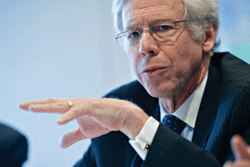On Wednesday, over dinner at Kronborg Castle, an hour’s drive from Copenhagen, members of the Institute of International Finance (IIF) attending the spring meeting for the banking industry trade association bade farewell to Josef Ackermann after nine years as chairman.
Any bankers nursing a sore head the next morning might have been surprised to hear Charles Dallara, managing director of the IIF for the past 19 years, announce his intention to step down later this year after the IIF celebrates its 30th anniversary in Tokyo.
Dallara says he had informed the IIF’s board of directors, the heads of some of the world’s largest banks, of his intention to step down 18 months ago when he last renewed his two-year contract. A replacement has not yet been announced.
To add to the sense of transition, Dallara let it be known that the group’s husband and wife press gurus Frank and Emily Vogl are also poised to retire.
Dallara is a former JPMorgan banker and former US Treasury assistant secretary for international affairs who has overseen the growth of the IIF since its early days as an informal group of a handful of large US commercial banks that negotiated Latin American debt restructurings.
It has developed into a trade association for international financial institutions of all types, including investment banks, asset managers and insurance companies from around the world. It now boasts a membership of 459 financial firms, many headquartered in emerging markets. It has also grown its research staff and country economists into a formidable team of forecasters.
The group has played a lead advocacy role in articulating the banking industry’s response to the welter of new regulations that have come its way since the crisis began in 2007 and 2008. That has presented Dallara with challenges within and outside the organization.
As the senior staff member, it has fallen to Dallara to present an industry face when members of the IIF have had very different agendas. Notably, in the early days after the crisis, the IIF argued stridently against efforts to reform global financial institutions into holding companies for separately capitalized subsidiaries, even though this was the business model pursued by prominent members, such as Santander and HSBC.
Douglas Flint, chairman of HSBC Holdings, takes over from Ackermann. Flint has been on top of regulatory affairs since his time as chief financial officer of HSBC and should be an extremely capable replacement for Ackermann.
In the past 12 months, Ackermann and Dallara achieved a new prominence, reminiscent of that once enjoyed by Citi’s Bill Rhodes in its early days in the depth of the Latin American crisis. The two took over formal negotiations on behalf of private sector creditors with the EU, national governments, the International Monetary Fund and the European Central Bank over the debt restructuring for Greece, the largest sovereign debt restructuring plan in history.
Representing an array of asset managers, hedge funds and banks in these negotiations was tough enough. Having to engage not only with the troika on the other side but also separate European governments was particularly arduous. On countless occasions Dallara and Ackermann thought they had achieved a workable compromise only to be dragged back to the negotiating table by one government or another.
At the meetings in Copenhagen, time and again senior IIF figures referred to the ''success'' of the Greek restructuring in achieving €100 billion of debt forgiveness for the country without which its present uncertain chances of proceeding with structural reform and regaining competiveness would have been non-existent. History has yet to make its judgement.
 |
| Charles Dallara |
Certainly, Dallara and Ackermann took great pride in enduring the arduous negotiations. Dallara recalls a hedge fund manager telling him the odds against securing a deal for Greece were 99 to one. On the day after the restructuring was finalized earlier this year, the hedge fund manager sent him a four-word email of congratulation. It read: “You win. I lose.”
It’s not clear what role the IIF might take in any future sovereign debt restructurings. It has taken on a wide range of technical work, with many committees of senior financiers devoting time and effort to various issues of industry best practice.
At the Copenhagen meetings, it issued a dense 60-page report on recommendations for cross-border banking resolution. It announced a new joint committee of private sector bankers alongside senior officials from finance ministries, central banks and multi-laterals to explore new approaches to sovereign-debt-crisis prevention and resolution.
Dallara says: “We need to learn the lessons of the Greek crisis and the broader euro area sovereign debt crisis to contribute to important improvements in crisis management. The goal of the committee is to develop concrete proposals to enhance crisis prevention and resolution practices.”
It looks likely that his successor will have to put these into execution. With the board of the IIF having had advance notice of his intentions, the search for a new managing director is well under way. ‘It will be strange,” says one attendee. “He’s been such a fixture for so long. And so has Frank.”
Dallara offered an insight into the pressures of the Greek negotiation when offering apologies to the membership for leaving the Copenhagen meeting a few hours early – the first time he has ever done so – to attend the high-school graduation of his 18-year-old son.
It’s a lesson even the toughest negotiator eventually learns. There are some battles you don’t even fight.
